BIGGEST RETAIL MERCHANT IN WORLD WAS LONG A FAILURE
[Welland Telegraph, 26 June 1917]
Frank W. Woolworth was Gawky Farm Boy-Married on $10 a week and was Reduced to $8-His First Five Stores Failed-Now Employs 50,000 People and Owns Tallest Building
Three titles to distinction are claimed for Frank W. Woolworth. First, he is the largest retail merchant in the world. Second, he owns the tallest building (and one of the handsomest) in the world. Third, he was the greenest and gawkiest boy who ever came off a farm. He was such a palpable hayseed, indeed, that try as he might, no merchant at first would engage him at any price. He had to work for three months without any wages and board himself, and he was told that he ought to consider himself lucky because he did not have to pay his employer a tuition fee. For a humble beginning that must come pretty near to breaking all records.
When finally young Woolworth did find work, without wages, and after two and a half years moved on to another job at $10 a week, so complete a failure did he prove at selling goods, according to B.C. Forbes, writing in Leslie’s, that his small pay was reduced instead of increased-and the shock temporarily shattered his health. Biography probably contains no more novel experience of an American captain of industry.
It was in 1873 that young Woolworth arrived in Watertown, N.Y., with a note of introduction to the senior partner of Augsbury and Moore, dry goods merchants, but didn’t want them.
At the end of two and a half years he was getting $6 a week. Hearing of a vacancy in another store he went to apply. But when he saw how higgledy-piggledy everything was he decided to name a high salary, thinking to be turned down. He asked $10 a week and was astonished when the proprietor said,: “All right, when will you commence?” He took the job, and on this big salary he felt justified in getting married. After a couple of months, the proprietor met him in the basement one day and unceremoniously told him there were boys getting $6 a week who sold more goods than he sold, and that they could not continue to pay him $10 a week. So his pay was cut to $8 a week-and he a married man.
“This was a terrible blow, and under it my health gave way. For a year I was at home unable to do a stroke of work. I became convinced that I was not fitted for mercantile life. Eventually my former employers offered me $10 a week to come back and tone up the store. I remained with them two years until I opened up my first five-cent store at Utica, N.Y., on February 22, 1879.”
We read that, less than two years after the pioneer five-and-ten-cent store idea was inaugurated, its author finding himself worth $2,000, “which looked bigger to him then, than $20,000,000 would now,” and in need of a vacation, revisited Watertown and “was received like a conquering hero.”
Incidentally three out of the first five stores opened by Woolworth proved failures. In fact it was not until he opened a five-and-ten-cent store in New York in 1886, and again lost his health through overwork, that he began to see success written in big letters. Since his first breakdown his health had never recovered fully and at the time, we read, he was running his New York office single-handed, with the result that he was stricken with typhoid fever and for eight weeks was unable to attend to business.
Today-thirty years later-the business boasts a store in every town of eight thousand population or more in the United States, has a daily average of over two and a quarter million customers and gives employment to between forty and fifty thousand people. It has become a $65,000,000 organization whose most colossal advertisement, if not monument, is the sixty story New York skyscraper for which the erstwhile Watertown “failure” paid $14,000,000 in cash. His somewhat Napoleonic ambition, we read, is “to open a store in every civilized town throughout the world.”
[Welland Tribune, 28 June 1917]
A quiet but pretty wedding was solemnized at St. Catharines on Tuesday afternoon when Maud the daughter of Mr. and Mrs. William Burgess was united in marriage to Charles, the son of Mr. and Mrs. Richard Jamieson, formerly of Welland. They were married at the Methodist Parsonage, Welland Ave., by the Rev. Mr. Hamilton. The bride wore white voile trimmed with lace and satin and carried a bouquet of roses; her niece Miss Lillie Strawn acted as bridesmaid dressed in pale blue voile and also carried a bouquet of roses. The groom was supported by Mr. Edward McCovey of Welland.
They left mid showers of confetti on the 5 o’clock train for London, and other points. On their return they will reside at 154 Lake Avenue, St. Catharines. Congratulations. Married: 26 June 1917
[People’s Press, 13 November 1917]
On Sunday morning, November 11th, Michael McAuliff, passed away at his residence, 93 Bald Street, Welland. He was in his 74th year. Deceased was born in Ireland and when a child of about three years came to America. The greater part of his life was spent in Welland but he also spent a number of years in the United States. He was in Brooklyn during the time of the American Civil War and served three years in the Grand Army of the Republic. He was also a contractor while he was in the States. He afterwards took contracts on the Welland canal. He was a member of the Weddell Dredging Company and also had contracts on the Murray canal near Trenton and all along the St. Lawrence river to Montreal.
He was also associated with the Manley Dredging Company, but not actively engaged. For the past seventeen years he has been retired from active work, though associated with many business activities. In much of the pioneer dredging he took a prominent part. He was a Governor of Montreal General Hospital. He also was interested in the founding of the Welland County Hospital and a charter member of the Welland Club. In religion he was a Roman Catholic and in politics a Liberal.
A wife and two sons, William and Francis, both of Welland, and one daughter, Margaret, also of Welland.
Funeral at St. Andrew’s church on Tuesday morning. Interment at St. Catharines.
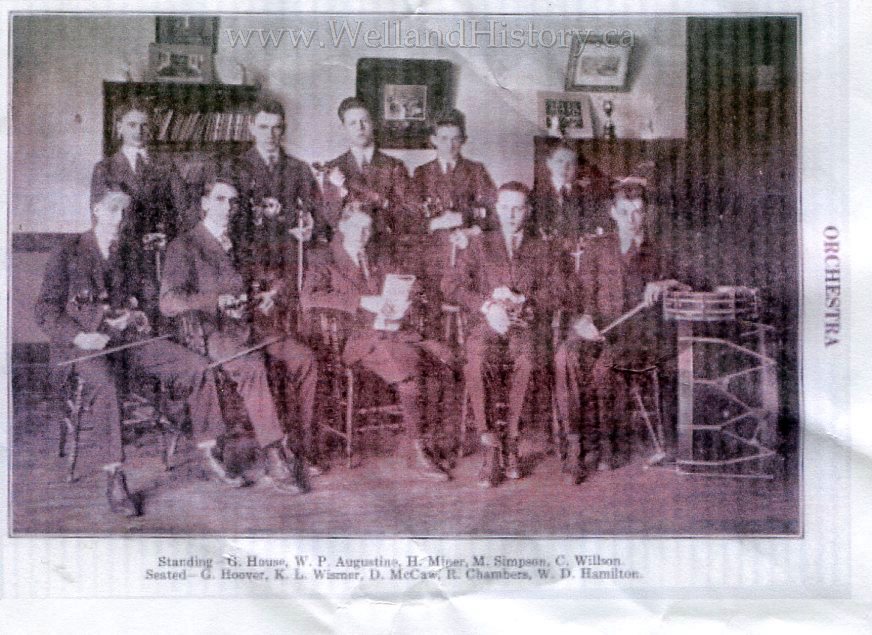
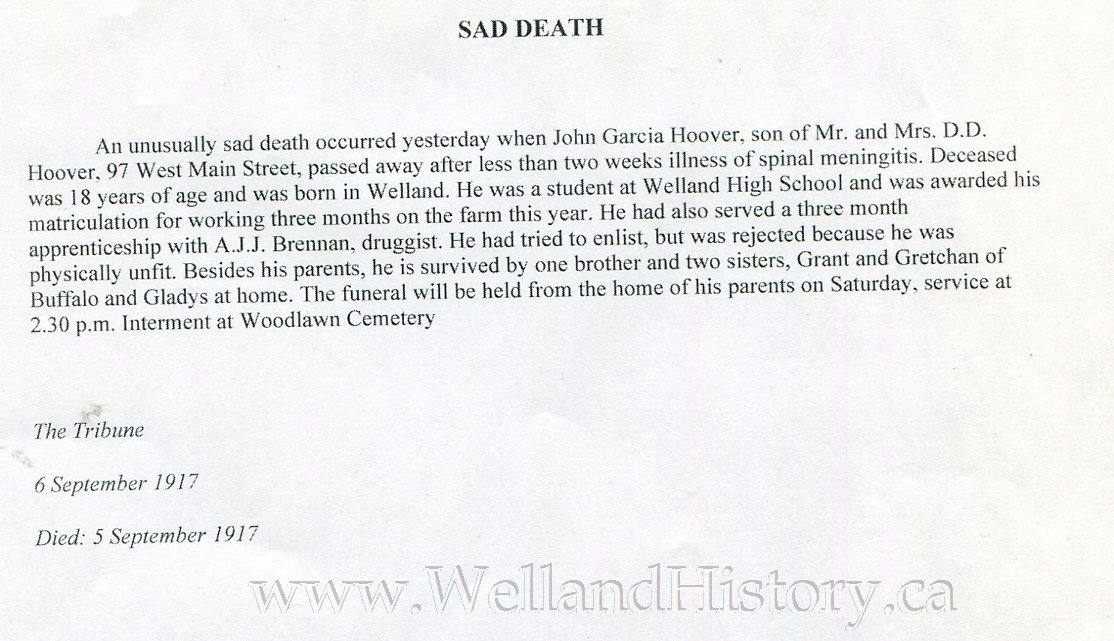
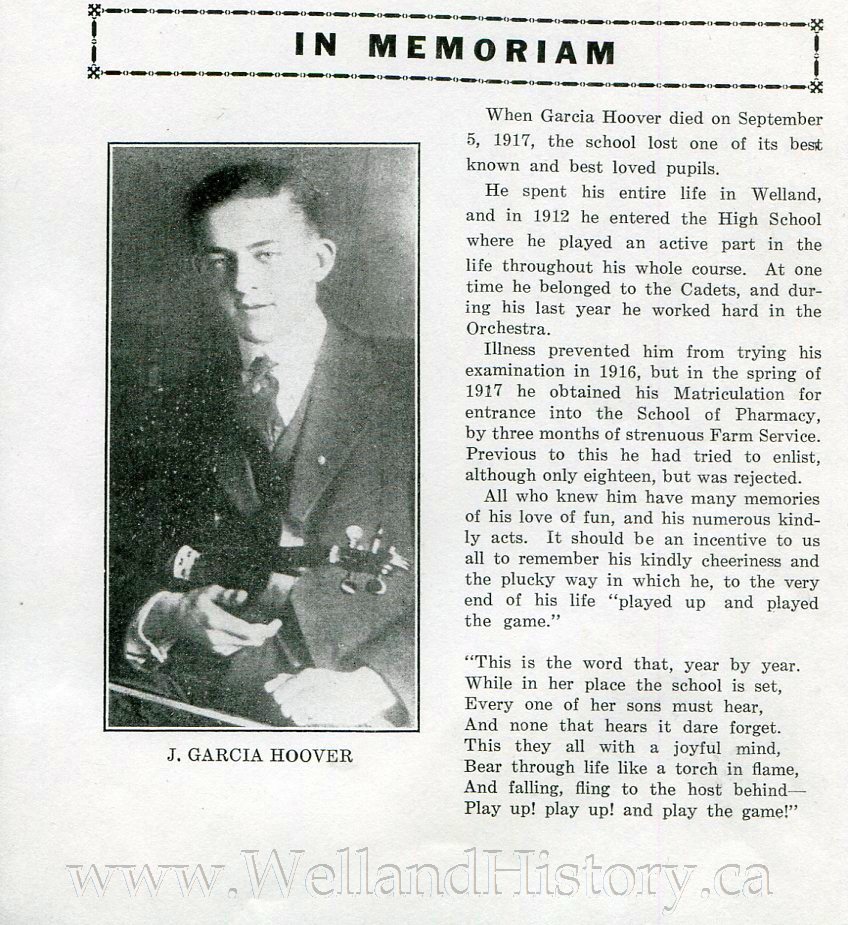
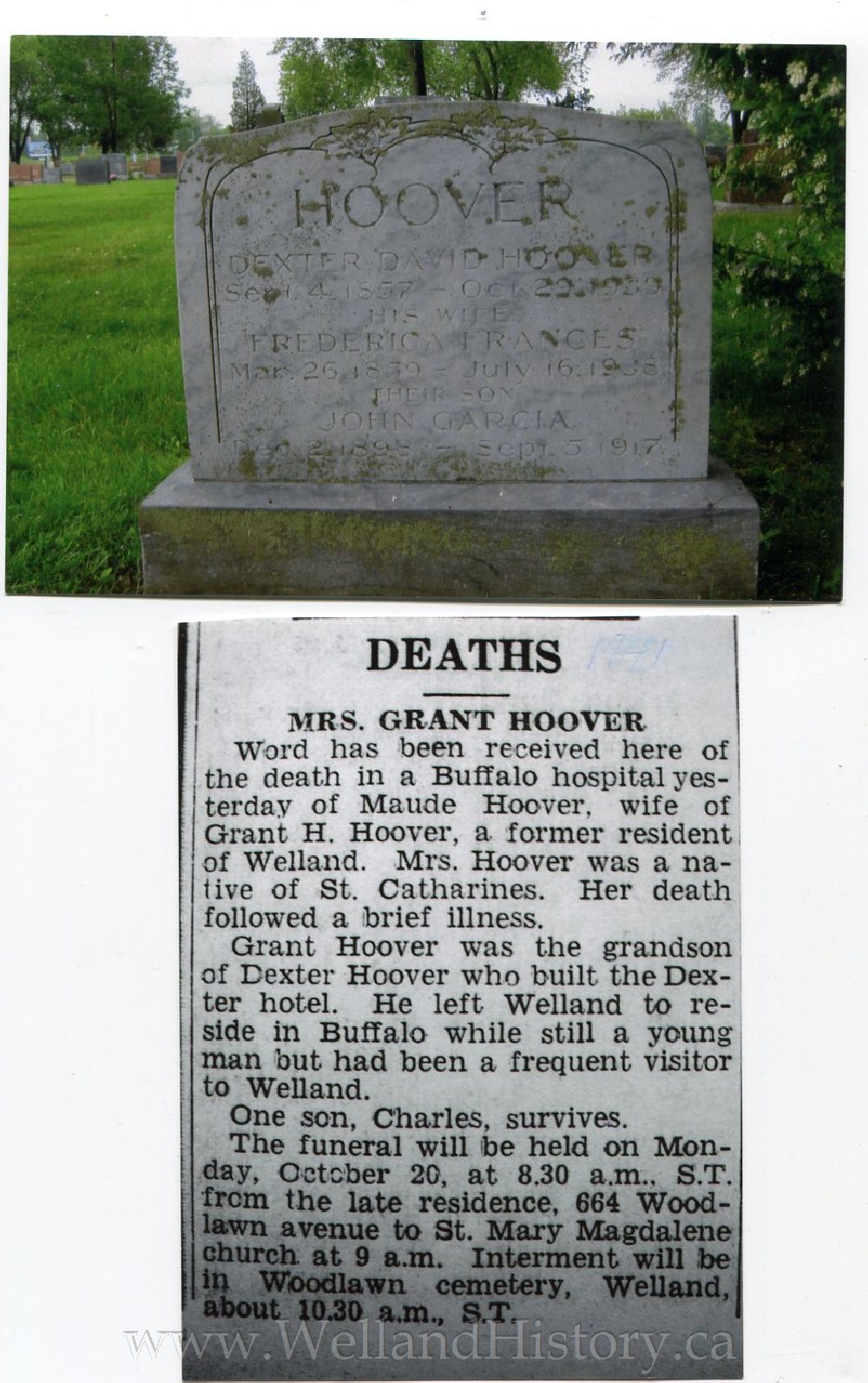
SERGT. HARRY BEST KILLED IN ACTION
Eldest Son of Reeve W.J. Best of Welland
His Service on the Field Had Been Rewarded by Promotion and He Was Just About to Leave for England to Take Lieutenant’s Course
[Welland Tribune, 12 June 1917]
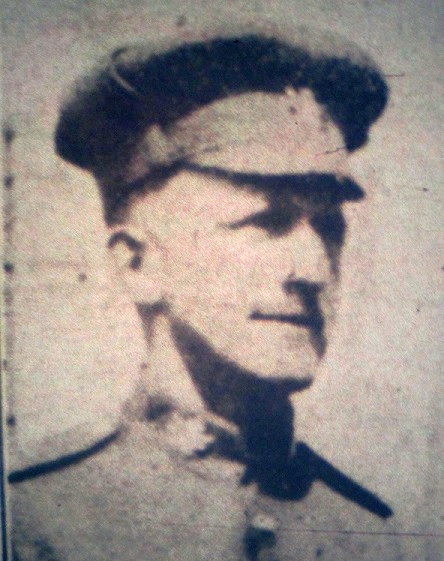 LETTER OF SYMPATHY
LETTER OF SYMPATHY
At the meeting of the county council on Friday morning, Reeve Steele made feeling reference to the bereavement that had fallen upon Reeve Best, and moved that the council stand adjourned until afternoon as a mark of sympathy and respect for Mr. Best. The motion was carried and a committee was appointed consisting of the Warden and others to draft a suitable letter of sympathy to Mr. and Mrs. Best.
Sergt. Harry Best, elder son of Reeve W.J. Best and Mrs. Best, was killed in action on May 22nd.
Such was the information conveyed in an official telegram from Ottawa on Friday morning.
In his death there is an added tragedy. Brig.Gen. Hill had recommended him for a three months’ absence in England where he was to take out his papers as lieutenant. A fine recognition of his services in the field. At the last moment he was asked to go up the line once more. In the fort-night following he lost his life.
Harry Best will be gratefully remembered by Welland as a young man who made good. Engaged on the customs staff, he might have taken shelter in his employment, but like his brother, Frank, he early chose to follow the flag. He had the ability and his heart was right, so it is not strange his service has been splendid.
His parents and brother and sister have the very sincere sympathy of many friends in the great loss they have sustained. Harry was born in Welland and was 30 years of age last October. He joined the 76th battalion, spent the summer and autumn at Niagara and the first winter in Barrie and at Easter time last year, went overseas.
Frank was severely wounded in October last, losing one eye and having his left arm permanently incapacitated. When he was released from hospital he joined the Army Corps pay office and he is still on duty.
In a letter written May 4th, Harry Best said:- “I have good news for you. Some days ago I was called to Brigade headquarters and was questioned by the Brigadier, who was from Niagara Falls (Brig, Gen Hill.) After looking over my papers and coming to my name and address, he looked me over and said, “Are you the son of Billy Best.” The Brigadier signed the papers, and just as soon as they go through Division, I go to England for a three months’ course for a lieutenant’s stars. What do you think of that? “There’s sure strange things happening in France these days.”
Harry and Frank Best enlisted with the 76th battalion in 1915, going overseas in April 1916. Both were corporals, but when they went to France in July 1916, they gave up their stripes. In September, both were again awarded the corporal’s stripes for carrying in wounded and carrying up rations. In the battle in October when Frank was so badly wounded, Harry won his sergeant’s stripes. Apparently his conduct on the Vimy Ridge battle won a lieutenancy for him as described in the letter quoted above. He had not asked for the promotion.
Following the battle of Vimy he wrote, “My how you all must have worried while our boys were in the thick of one of the greatest battles of the war, and I am sure, that through the dark hours, even though all your loved ones were in danger, nevertheless, that thrills of pride will course through every true Canadian’s veins whenever mention is made of the our lads’ dashing victory.”
The last letter received from him, dated May 14, stated that he had again gone up the line the day before, though apparently he had expected to leave for England before that.
In a letter of May 8, he says:- “We are out of the line for a time and will have a good rest. The weather could not be finer. Today we had a gentle shower and everything growing took on a greener shade. It’s just fine to be able to be about to enjoy the invigorating scenery. One evening before leaving the forward area we went to a wood where daffodils were growing in profusion. These we dug up in patches of soil and took them to the final glorious resting place. We miss the lads, but what is more grand than the thought that they have fought the good fight and have only gone ahead. They live in our memory, the grass and flowers grow around about and the birds sing overhead. They are only resting-our honored dead.”
Now the writer lies in his “final glorious resting place.” In that silent company there will be none who have done their duty with greater courage and valor. It would seem almost as if this letter had been written with the intention of preparing his parents for the news that was so soon to follow.
Robert Harry Best is buried at Petit-Vimy British Cemetery, Pas de Calais, France.
Late Joseph Henry Young
[People’s Press, 9 January 1917]
In the death of Joseph H. Young, who passed away on December 21st, 1916, in the 73rd year of his age, Welland loses one of its oldest residents. Mr. Young was born in Genessee County, N.Y., in 1843, and removed to Welland with his parents in the fifties. For some years he carried on a cooperage business in what is now called Welland’s Garden Ward. For many years he took a deep interest in amateur theatricals, and in Welland’s early history gave to the people of the village many evenings of amusement, and was generally seen in the role of the villain. One of his favorite plays was the ever popular “Uncle Tom’s Cabin,” in which the deceased always took the part of the notorious slave driver, Simon Legree. “Ten Nights in a Bar Room” was another play that he put on the stage, and which was always looked forward to by the populace in those days when the only hall available was the “Old City Hotel Hall,” now located at the back of the Temple Building, and now used by the Salvation Army as their barracks. After the building of Orient hall, when travelling show troop commenced to make Welland one of their stopping places, Mr. Young became theatrical manager for the owner of the hall which position he held until the hall was converted into a “Movie Show.” He was a man of quiet disposition and had many warm friends. He was married to Miss Davidson of Thorold township, who predeceased him about two years ago. Three children survive: R.H. Young of Grand Rapids, Mich., Minnie of Pittsburg, Pa., and Adolph of San Diego, Cal. The remains were laid at rest in Woodlawn Cemetery.
*Note: Tombstone dates-26 September 1842-20 December 1916. Death certificate d: 21 December 1916.
Leo Michener Had Been Up But Ten Minutes With Experienced Instructor
Machine Took a Nose Dive From a Height of Three Hundred Feet-Buried in Churchyard of Euston
[Welland Telegraph, 4 September 1917]
Mr. and Mrs. B.J. Michener last week, in letters from the Old Land, received the first details of the accident wherein their son Leo met his death.
Lieut. E.C. Eaton, Leo’s room mate and pal wrote as follows:-
“We reported to this squadron on the morning of the 1st, direct from Reading. That day being dull, no flying was done. The next day it rained but towards evening the rain stopped and it began to clear up. Though still pretty bumpy the squadron commander gave orders for flying and soon nearly everybody was up. The squadron commander himself, Major Ross, took Leo up in his machine for his first trial flight. The major was an experienced pilot and had been flying in France for the past two years. They were up about ten minutes and about a mile from the hangers when their machine was seen to suddenly nose dive from about three hundred feet. When the doctor got to the plane, about five minutes afterwards, the major was dead and Leo was unconscious. In another minute he breathed his last, without gaining consciousness and I can assure you that he could have suffered no pain.
On Saturday afternoon Leo was buried in the churchyard of the little village of Euston, about a mile and a half from this aerodrome. It was a military funeral, of course, with a firing party from a neighboring battalion. “Last Post” was sounded at the close of the service.”
 Subscribe..
Subscribe..




 LETTER OF SYMPATHY
LETTER OF SYMPATHY